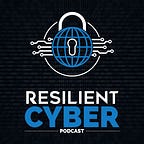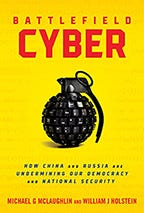- First off, for those unfamiliar with this problem and situation, what exactly is the challenge here, and why should more people be paying attention to this?
- What do you say to those who may say this is just something occurring in the digital realm, and not a physical or real threat, given the ubiquity of software, this seems short sighted, no?
- In the book, you touch on malicious actors using U.S. based infrastructure to attack U.S. targets, a topic that was touched on in the NCS, can you expand on that and the challenges with addressing it, particularly in the cloud?
- There's fears that these adversaries are looking to persist in U.S. based systems and infrastructure in advance of future conflicts. What could be some of the ramifications of this in the future, and how do we go about rooting out these threats in the here and now?
- The Defense Industrial Base (DIB) is often called the "soft under belly" of the DoD. We've seen increased targeting of the DIB by malicious actors and nation states and the emergence of efforts such as NIST 800-171 and now CMMC. How do we go about ensuring improved security posture of the DIB while balancing the cost and burden on SMB's and further constraining the diversity and resiliency of a DIB supplier base?
- On the flip side, we see the DoD, IC and Federal Government with deep dependencies on a small handful of technology companies, some, even despite continued exploitation and vulnerabilities impacting these agencies. How do we go about addressing this elephant in the room and demand stronger security outcomes and performance from these critical suppliers, especially with their massive financial and political clout?
- Much of these activities occur below the threshold of traditional "declarations or acts of war". How do we get our leadership to realize we're already at war, but in a new paradigm?
- You guys talk about how everyone with an internet connection is essentially on the battlefield. How do we address that reality while balancing aspects of our society that are unique, such as freedom and privacy. Citizens continue to use software and applications that expose their data, that of their employers, and in some cases, even of the DoD and national security. How do go about better informing and engaging the citizenry on this front?
- Another aspect you touch on, is that this isn't just a technical issue, but there's efforts such as misinformation and such to degrade trust in our institutions, sow resentment and stoke flames of divisiveness in our society. These threats are likely even more concerning, as we tear ourselves apart internally. What are your thoughts on this front?
S4E24: Michael McLaughlin & Bill Holstein - Battlefield Cyber
Aug 04, 2023

















